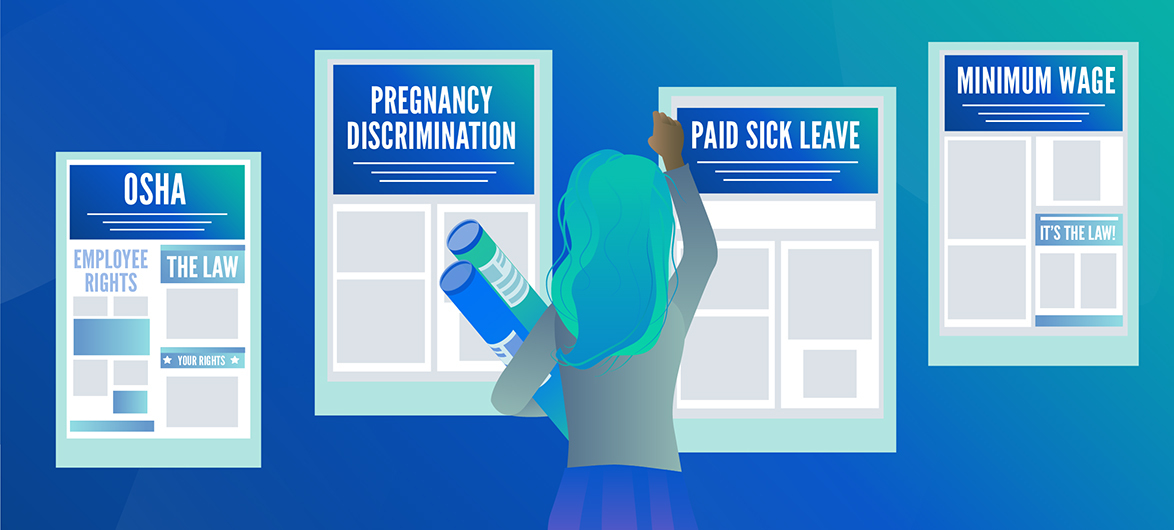With each passing year, keeping up with labor law posting changes becomes more complicated and difficult to manage. More and more laws are being passed on the state and local level, particularly cities and counties, granting expanded protections to employees. In 2018 alone, we experienced a flurry of new laws covering issues like minimum wage, paid sick leave, pregnancy accommodation, sexual harassment and more.
With each new law, there’s a potential poster update or new poster issued. It takes nearly constant awareness and action to keep your business fully compliant. To help you enter the new year on the right foot, I’m going to address the major trends we’ve seen in the past year affecting labor law posting compliance, including specific posting changes you need to know about. I’ll also share what we’re currently watching, so you’ll have a sense of what is pending and likely to affect your postings in 2019.
First Up: Federal-Level Changes
In 2018, there were no mandatory changes to any of the six federal postings required for employers with 50 or more employees: EEOC, OSHA, FMLA, USERRA, FLSA and EPPA. However, for 2019, some legislation is pending that could impact these federal labor law posters, including:
- Workflex in the 21St Century Act
- Family and Medical Insurance Leave Act (FAMILY Act)
- Economic Security for New Parents Act
- Federally mandated E-Verify
Note, too, that a change to the “EEO Is the Law” poster issued by the EEOC is also pending. This mandatory update is based on a 2015 law prohibiting discrimination due to sexual orientation and gender identity, as well as a 2014 law expanding veteran protections.
What We’re Seeing with State Labor Law Compliance

There are approximately 150 state law poster changes per year, and more than 50% require immediate mandatory replacements.
On the state level, compliance gets a lot more involved. In addition to displaying a set of six federal posters, employers must post several state-issued employee notices at each posting site. More states and cities are giving employees expanded protections beyond what federal law provides, and this is what triggers the majority of poster changes.
For example, several states passed laws in 2018 aimed to reduce sexual harassment in the workplace, which required new or updated postings that year: California, Delaware, Illinois and Vermont.
Further, there were these additional state-level legislative changes:
OSHA
- Alaska, Virginia, Wyoming — Updated OSHA posters to incorporate information about OSHA’s new penalty amounts for various violations
- Hawaii, South Carolina — Updated OSHA posters to incorporate new federal OSHA recordkeeping requirements for work-related accidents and fatalities
Pregnancy Discrimination
- New Jersey, South Carolina, Vermont — Updated or issued new posters addressing pregnancy discrimination and clarifying employer responsibilities to provide reasonable accommodations
Paid Sick Leave
- Maryland, New Jersey, Rhode Island — New posters were issued based on laws requiring employers to offer paid sick leave (beyond limited federal provisions)
Minimum Wage
A large number of state posting changes involved minimum wage increases. In 2018, 13 states had minimum wage increases that required posting changes: Alaska, Arizona, Colorado, Florida, Maine, Minnesota, Missouri, Montana, New Jersey, New York, Ohio, Oregon and Rhode Island. (Other states had increases, but previous versions of posters remained compliant.)
And now for the new year, the following states announced minimum wage increases and have already issued new posters for 2019:
Note: A Michigan minimum wage of $9.45 goes into effect March 29, 2019, and a poster hasn’t yet been released.

Non-compliance can be costly. Government posting fines on the federal level recently increased to $34,000+ per violation. State and local fines typically range from $100-$1,000 each.
Drilling Down Even Further: City and County Posting Compliance
I’m not going to get into all the details here, but you should know that the number of cities and counties requiring employers to post notices is growing, too. In general, these postings cover employment laws similar to the state posters – minimum wage, paid sick leave, prohibition against discrimination and sexual harassment – but cities have the discretion to pass laws offering more protections.
For example, in California alone, 14 cities increased their minimum wages and issued new postings, effective January 1, 2019. Further still, a handful of city/county posting changes covering minimum wages, earned sick leave and paid sick leave are still pending in 2019 for cities in California, New York and Texas.
And to answer a question that comes up a lot: Yes, you must post the city posters in addition to the state and federal. Even though the legal differences may be small, and the postings may seem to conflict, you must post all three in the workplace.
How to Get Expert Help and Guaranteed Posting Coverage
I realize I covered a lot of information in this article, but 2018 was an extremely busy year for posting compliance – and 2019 is shaping up to be just as brisk. It’s understandable if you’re feeling a bit overwhelmed with the sheer volume of posting requirements. Fortunately, there’s no need to worry about tracking federal, state or local posting changes, or obtaining the necessary postings. With the Poster Guard 1 Smart App, replacements are automatically shipped to your business whenever updates or changes occur. It’s never been easier to maintain compliance and enjoy peace of mind that your business is covered, no matter what unfolds throughout the year.
- Every time a new labor law is passed, there’s a potential poster update or new poster issued
- There were no mandatory changes to federal postings in 2018
- However, numerous states passed new minimum wage laws and other expanded legislation requiring new postings in 2018, with additional pending changes for 2019
- City and county postings are a growing area of responsibility for employers, as more local agencies issue mandatory postings
- The Poster Guard 1 Smart App helps you maintain compliance through a single online tool






